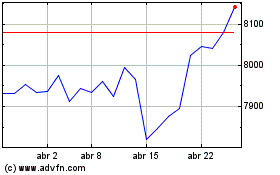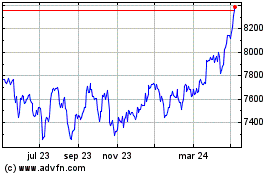European Shares Pause After Rally in Asia
07 Enero 2019 - 3:33AM
Noticias Dow Jones
By Joanne Chiu and Will Horner
European shares edged lower following a strong session in Asia
on Monday, after U.S. stocks surged in the previous session on
fresh signs of economic strength and the Federal Reserve said it
would be flexible with its interest-rate policy.
The pan-continental Stoxx Europe 600 fell 0.1% in opening trade.
Germany's Xetra DAX, France's CAC 40 and the U.K. FTSE 100 were all
down 0.1%.
U.S. stock futures pointed to opening gains of 0.5% for the Dow
Jones Industrial Average and Nasdaq Composite. S&P 500 futures
were 0.4% higher.
The yield on the U.S. 10-year Treasury note edged down to
2.651%, from 2.661% on Friday. Yields and prices move in opposite
directions. The U.S. dollar softened, with the WSJ Dollar Index,
which measures the dollar against a basket of 16 of its peers, down
0.2%.
In Asia, equities made strong gains. Japan's Nikkei 225 led the
rally, rising 2.4%, helped by a calmer yen, which steadied at
108.21 a dollar. South Korea's Kospi climbed 1.3%, Australia's
S&P/ASX 200 benchmark rose 1.1% and Hong Kong's Hang Seng Index
rose 0.8%.
China's Shanghai Composite advanced 0.7%. It rallied 2.1% Friday
ahead of a well-flagged move by the People's Bank of China to add a
net 800 billion yuan ($116.48 billion) of liquidity into the
banking system by cutting banks' reserve requirements.
The strong climbs in Asia followed a stock surge on Wall Street
Friday, after better-than-expected U.S. nonfarm payroll figures
suggested a healthy labor market and eased investors' concerns
about the potential for a U.S. economic slowdown.
Comments later that day from Federal Reserve Chairman Jerome
Powell--who said economic data suggested good momentum heading into
the new year--added a further boost to see the Dow industrials
close 750 points higher, or 3.3%.
Market participants were also awaiting developments from two
days of trade negotiations between the U.S. and China, which were
set to begin Monday.
Felix Lam, a portfolio manager at BNP Paribas Asset Management,
said policy makers in the world's two largest economies had helped
lift market sentiment, but the key question mark was whether the
two countries could reach a trade deal. "Any positive outcome from
the trade talks would have a more long-lasting impact on the
earnings trajectory of corporations in Asia," he said, adding
delays would hit corporate profits.
Nomura chief China economist Ting Lu said Beijing's latest moves
to unlock liquidity in the financial system "reflect its increasing
concerns about looming growth headwinds and its increased
willingness to step up policy easing and stimulus."
After Friday's announcement of two cuts totaling 1 percentage
point to Chinese banks' reserve requirement ratios, Mr. Lu expects
the ratios to be reduced by another 1.5 percentage points this
year. He also expects the central bank to extend more medium-term
lending facilities to banks, which then would make those funds
available to small businesses and private firms.
In commodities, Brent crude advanced 1.9% to $58.14 a barrel.
Gold was up 0.5% to $1,292.40 an ounce.
Write to Joanne Chiu at joanne.chiu@wsj.com
(END) Dow Jones Newswires
January 07, 2019 04:18 ET (09:18 GMT)
Copyright (c) 2019 Dow Jones & Company, Inc.
FTSE 100
Gráfica de índice
De Mar 2024 a Abr 2024

FTSE 100
Gráfica de índice
De Abr 2023 a Abr 2024
